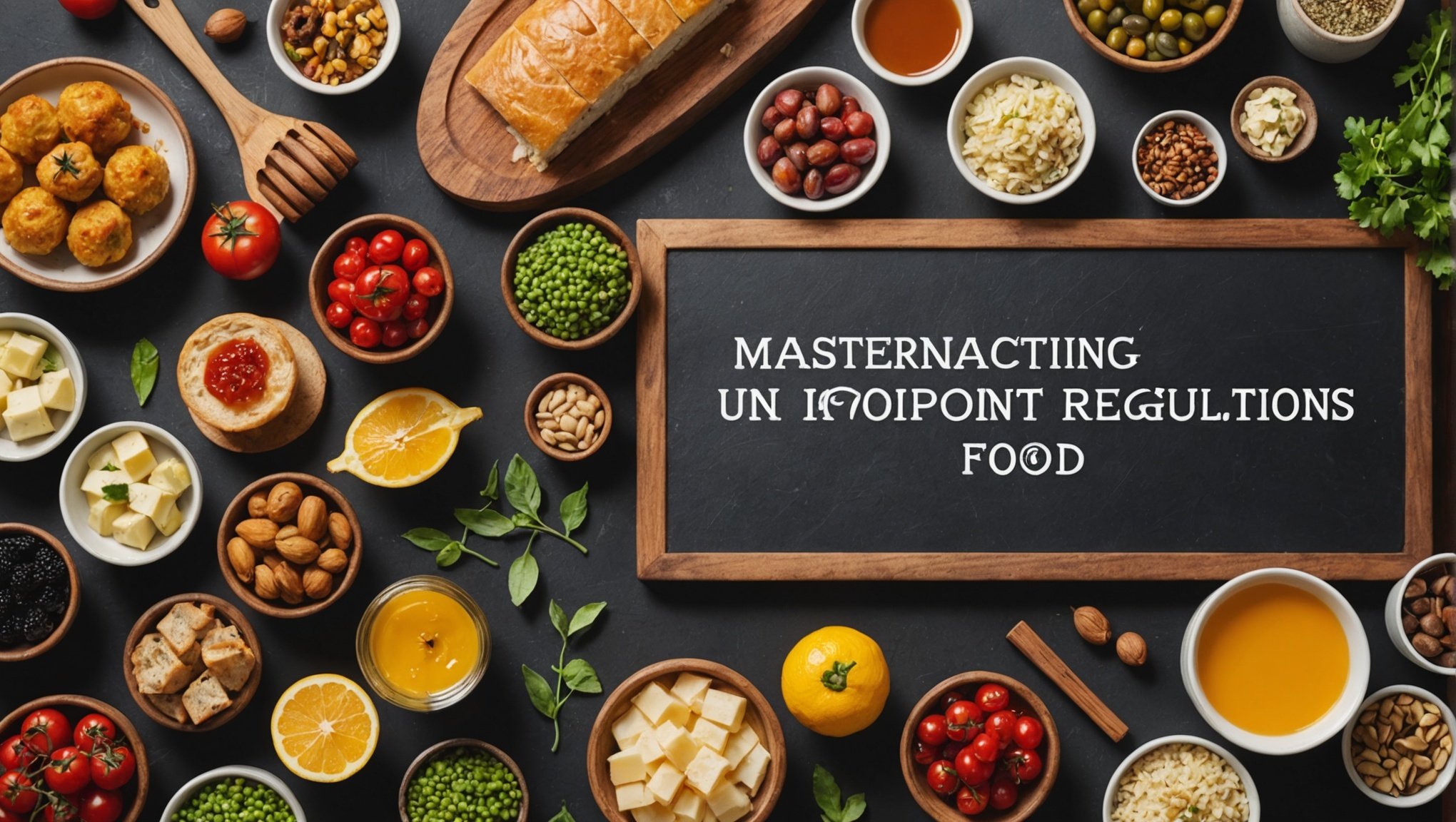Mastering UK Import Regulations: A Guide for Launching Your Gourmet Food Business
Starting a gourmet food business in the UK can be an exciting venture, but it comes with its own set of challenges, particularly when it comes to navigating import regulations. Understanding these regulations is crucial to ensuring your business operates smoothly and complies with all the necessary laws. Here’s a comprehensive guide to help you master UK import regulations and successfully launch your gourmet food business.
Understanding UK Import Regulations
Before you start importing gourmet food products, it’s essential to understand the regulatory landscape. The UK has a complex system of regulations that govern the importation of food products, and these regulations are designed to ensure food safety, protect public health, and comply with international trade agreements.
Additional reading : Mastering UK Packaging Waste Regulations: A Comprehensive Guide for Emerging Consumer Goods Brands
Key Regulatory Bodies
- Food Standards Agency (FSA): The FSA is responsible for ensuring that food imports meet the UK’s food safety standards. They work closely with other agencies like the Department for Environment, Food and Rural Affairs (Defra) and the Animal and Plant Health Agency (APHA).
- HM Revenue & Customs (HMRC): HMRC handles customs declarations and ensures that all import duties and taxes are paid correctly.
- European Union (Post-Brexit): Although the UK has left the EU, many EU regulations still apply, especially in the area of food safety and hygiene.
Compliance with Food Safety Regulations
Compliance with food safety regulations is paramount to avoid any legal issues and ensure the health and safety of your customers.
Food Safety Standards
- HACCP (Hazard Analysis and Critical Control Points): Implementing a HACCP system is crucial for identifying and controlling hazards in the food production process. This system helps in ensuring that your products are safe for consumption.
- Labeling and Packaging: Ensure that your products are correctly labeled and packaged according to UK regulations. This includes providing clear information about ingredients, allergens, and nutritional content.
- Inspections and Audits: Regular inspections and audits by regulatory bodies are common. Be prepared to provide documentation and evidence of your compliance with food safety standards.
Import Procedures and Documentation
Understanding the import procedures and the necessary documentation is vital for a smooth import process.
Also read : Mastering UK Intellectual Property Laws: A Comprehensive Guide for New Publishers
Required Documents
- Commercial Invoice: A detailed invoice that includes the description of goods, quantity, price, and country of origin.
- Customs Declaration: This is submitted to HMRC and includes details of the goods being imported, their value, and the applicable tariffs.
- Health Certificates: For certain food products, health certificates may be required to ensure they meet UK health and safety standards.
- Phytosanitary Certificates: These are necessary for plant-based products to ensure they are free from pests and diseases.
Shipping and Logistics
Shipping and logistics play a critical role in the import process. Here are some key considerations:
Choosing the Right Shipping Method
- Air Freight vs. Sea Freight: Air freight is faster but more expensive, while sea freight is cheaper but takes longer. Choose the method that best suits your business needs.
- Temperature-Controlled Shipping: For perishable goods, temperature-controlled shipping is essential to maintain the quality and safety of the products.
Inventory Management
- Warehouse Storage: Ensure you have adequate warehouse storage that meets food safety standards. This includes proper temperature control, hygiene, and pest control measures.
- Inventory Tracking: Implement an effective inventory management system to track your goods from the time they are imported to the time they are sold.
Market Research and Customer Needs
Understanding your market and customer needs is crucial for the success of your gourmet food business.
Identifying Your Target Market
- Demographics: Identify the demographics of your target market, including age, income level, and dietary preferences.
- Market Trends: Keep an eye on market trends and consumer preferences. For example, there is a growing demand for organic and sustainable food products.
Customer Feedback and Loyalty
- Transparency: Be transparent about the origin and production process of your products. Consumers today value transparency and are more likely to trust brands that are open about their practices.
- Customer Service: Provide excellent customer service to build loyalty. Respond promptly to customer feedback and address any concerns they may have.
Building Your Brand
Building a strong brand is essential for differentiating your business in a competitive market.
Creating a Business Plan
- Market Analysis: Conduct a thorough market analysis to understand your competitors and identify gaps in the market.
- Marketing Strategy: Develop a marketing strategy that includes social media, advertising, and in-store promotions.
- Brand Identity: Create a strong brand identity that reflects the values and mission of your business.
Product Development
- Product Range: Develop a diverse range of products that cater to different tastes and dietary preferences.
- Quality Control: Ensure that all your products meet high quality standards. Conduct regular taste tests and gather feedback from customers to improve your products.
Practical Insights and Actionable Advice
Here are some practical insights and actionable advice to help you navigate the complexities of UK import regulations:
Start Small
- Begin with a small range of products to test the market and ensure compliance with regulations before scaling up.
Seek Professional Advice
- Consult with experts in import regulations and food safety to ensure you are fully compliant with all the necessary laws.
Stay Updated
- Regularly check for updates in regulations and ensure your business is always compliant.
Detailed Checklist for Importing Gourmet Food Products
Here is a detailed checklist to help you ensure you have covered all the necessary steps:
-
Research and Compliance:
-
Understand UK import regulations and food safety standards.
-
Ensure compliance with HACCP and other safety protocols.
-
Check for any specific regulations related to your products.
-
Documentation:
-
Prepare commercial invoices, customs declarations, health certificates, and phytosanitary certificates.
-
Ensure all documents are accurate and complete.
-
Shipping and Logistics:
-
Choose the right shipping method based on your business needs.
-
Ensure temperature-controlled shipping for perishable goods.
-
Arrange for adequate warehouse storage that meets food safety standards.
-
Market Research:
-
Identify your target market and understand customer needs.
-
Conduct market research to stay updated on trends and preferences.
-
Brand Building:
-
Create a business plan that includes market analysis and marketing strategy.
-
Develop a strong brand identity and product range.
-
Focus on quality control and customer feedback.
Example of a Successful Gourmet Food Business
Let’s take the example of a business that specializes in importing gourmet baked goods from Europe.
Case Study: Artisan Bakes
- Market Research: Artisan Bakes conducted thorough market research to identify a gap in the UK market for high-quality, artisanal baked goods.
- Compliance: They ensured compliance with all UK food safety regulations and obtained the necessary health certificates and phytosanitary certificates.
- Shipping: They chose temperature-controlled shipping to maintain the quality of their products.
- Brand Building: They created a strong brand identity that emphasized the artisanal nature of their products and the high-quality ingredients used.
- Customer Feedback: They engaged with their customers through social media and in-store promotions, gathering feedback to improve their products.
Launching a gourmet food business in the UK requires careful planning, compliance with regulations, and a deep understanding of your market and customers. By following this guide, you can ensure that your business is well-prepared to navigate the complexities of UK import regulations and build a successful brand.
Final Tips
- Stay Flexible: Be prepared to adapt to changes in regulations and market trends.
- Invest in Technology: Use advanced technologies like blockchain to enhance transparency and traceability in your supply chain.
- Build Strong Relationships: Foster strong relationships with your suppliers, distributors, and customers to build trust and loyalty.
By mastering UK import regulations and focusing on quality, transparency, and customer satisfaction, you can set your gourmet food business on the path to long-term success.











